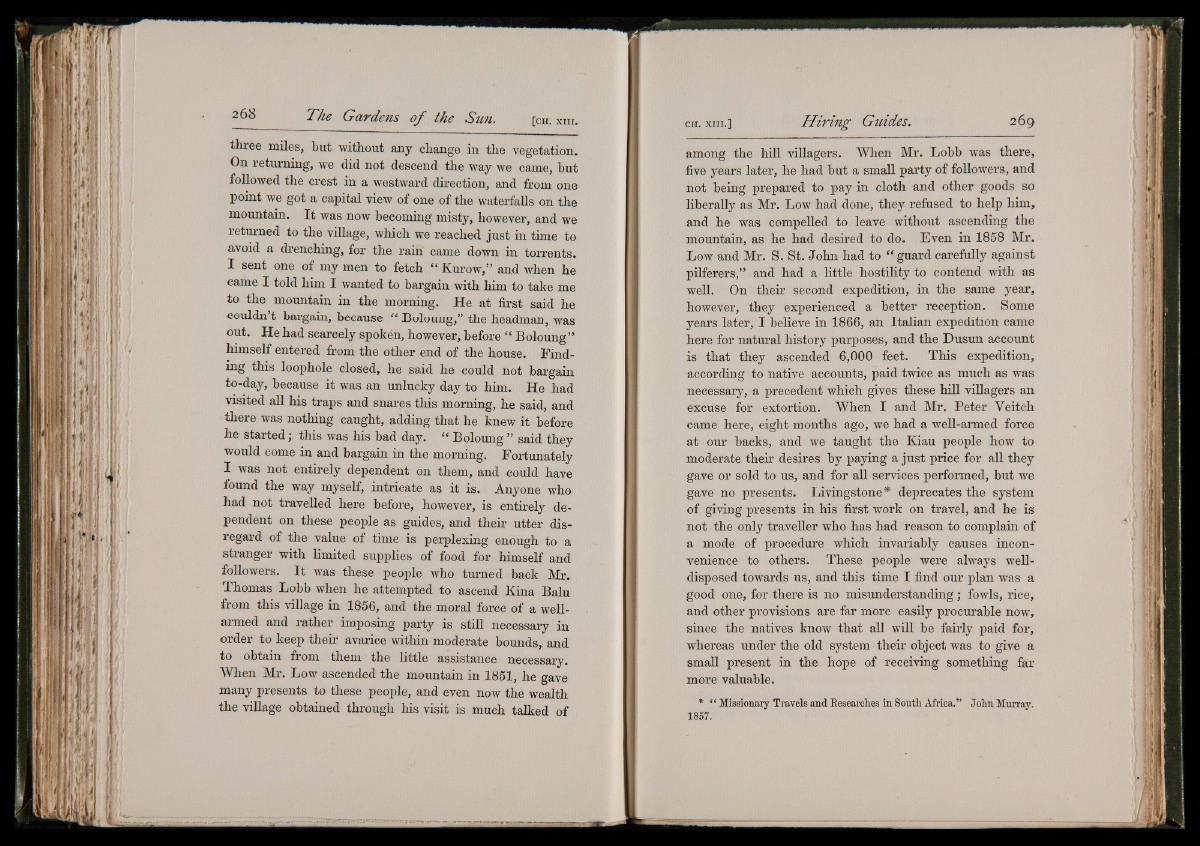
three miles, but without any change in the vegetation.
On returning, we did not descend the way we came, but
followed the crest in a westward direction, and from one
point we got a capital view of one of the waterfalls on the
mountain. It was now becoming misty, however, and we
returned to the village, which we reached just in time to
avoid a drenching, for the rain came down in torrents.
I sent one of my men to fetch “ Kurow,” and when he
came I told him I wanted to bargain with him to take me
to the mountain in the morning. He at first said he
couldn’t bargain, because “ Boloung,” the headman, was
out. He had scarcely spoken, however, before “ Boloung ”
himself entered from the other end of the house. Finding
this loophole closed, he said he could not bargain
to-day, because it was an unlucky day to him. He had
visited all his traps and snares this morning, he said, and
there was nothing caught, adding that he knew it before
he started; this was his bad day. “ Boloung 1 said they
would come in and bargain in the morning. Fortunately
I was not entirely dependent on them, and could have
found the way myself, intricate as it is. Anyone who
had not travelled here before, however, is entirely dependent
on these people as guides, and their utter disregard
of the value of time is perplexing enough to a
stranger with limited supplies of food for himself and
followers. It was these people who turned back Mr.
Thomas Lobb when he attempted to ascend Kina Balu
from this village in 1856, and the moral force of a well-
armed and rather imposing party is still necessary in
order to keep their avarice within moderate bounds, and
to obtain from them the little assistance necessary.
When Mr. Low ascended the mountain in 1851, he gave
many presents to these people, and even now the wealth
the village obtained through his visit is much talked of
among the hill villagers. When Mr. Lobb was there,
five years later, he had but a small party of followers, and
not being prepared to pay in cloth and other goods so
liberally as Mr. Low had done, they refused to help him,
and he was compelled to leave without ascending the
mountain, as he had desired to do. Even in 1858 Mr.
Low and Mr. S. St. John had to “ guard carefully against
pilferers,” and had a little hostility to contend with as
well. On their second expedition, in the same year,
however, they experienced a better reception. Some
years later, I believe in 1866, an Italian expedition came
here for natural history purposes, and the Dusun account
is that they ascended 6,000 feet. This expedition,
according to native accounts, paid twice as much as was
necessary, a precedent which gives these hill villagers an
excuse for extortion. When I and Mr. Peter Veitch
came here, eight months ago, we had a well-armed force
at our backs, and we taught the Kiau people how to
moderate their desires by paying a just price for all they
gave or sold to us, and for all services performed, but we
gave no presents. Livingstone* deprecates the system
of giving presents in his first work on travel, and he is
not the only traveller who has had reason to complain of
a mode of procedure which invariably causes inconvenience
to others. These people were always well-
disposed towards us, and this time I find our plan was a
good one, for there is no misunderstanding; fowls, rice,
and other provisions are far more easily procurable now,
since the natives know that all will be fairly paid for,
whereas under the old system their object was to give a
small present in the hope of receiving something far
more valuable.
* “ Missionary Travels and Researches in South Africa.” John Murray.
1857.